ADSactly Literature: Benchmark Theater - Rosencrantz and Guildenstern are Dead
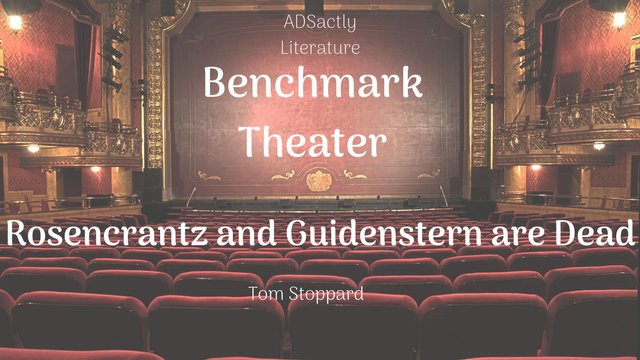
If you’ve been following along our latest @adsactly series about theater, you’re probably by now wondering when we’ll do a post about Shakespeare. And I think that’s a very good question, being as he is the godfather of modern theater. Alas, I don’t know if an actual Shakespeare post is in the cards for us. It might be. The thing with Will Shakespeare is there’s just so much material to choose from. And if we were indeed to take a look at all the worthwhile plays that he has produced, we’d practically swamp your feed with Shakespearean names and quotes and we don’t want that.
So, maybe there’ll be a Macbeth somewhere in the future, or perhaps a Henry V, but for now, we’re focusing on one of my favorite Shakespeare-inspired play – Rosencrantz and Guildenstern are Dead.
Now, in case you’re not familiar, Rosencrantz and Guildenstern are two secondary characters in Hamlet. But in Rosencrantz and Guildenstern are Dead, Tom Stoppard turns that on its head, making Ros and Guil (as they are referenced in the actual text of the play) the main characters, while Hamlet himself only appears briefly.
Personally, I find this reversal very interesting because it reflects how our own minds work, you know? Because, in my story, I’m the main character. But you, as my friend or neighbor or whatever, in your own story, you’re the main character and no matter how vital the events in my life may be, they’re just an unimportant backdrop for your own story to unfold.
The plot of the play remains the same as in the original Hamlet, just told from a different perspective. We begin with Ros and Guil flipping coins and Ros betting each time on heads, and always winning more than sixty times in a row – highly unlikely in our real world, which makes the characters doubt their own reality.
The King and Queen of Denmark ask Ros and Guil (as childhood friends of Prince Hamlet) to discover what is at the root of Hamlet’s madness. This scene is from the original play and is the first appearance of Ros and Guil in Hamlet.
But the Prince always manages to outwit them and escape their questioning. Ros and Guil figure it out that Hamlet is the way he is because his uncle, the King, murdered his father and married his mother. A pretty good reason to go a bit crazy, I’m sure you’ll agree.
Throughout the play, the duo seem to have a close connection with the Tragedians, a troupe of actors who are preparing a show – The Murder of Gonzalo – to be presented in front of the royal family. Ros and Guil attend the dress rehearsal of the play, which shows two characters that resemble them take a voyage to England and meet their deaths at the hands of English soldiers. Of course, this is foreshadowing their actual grim fates. And while Rosencrantz doesn’t get it, Guidlenstern is frightened by the play and attacks the Tragedians, claiming they’re not showing death in a realistic manner.
I'd prefer art to mirror life, if it's all the same to you.
Ros and Guil become unhappy when they realize they’re mere pawns of the King and Queen and agree to accompany Hamlet on a voyage to England (where he has been exiled) so as to escape the machinations of the court.
Strangely, in Act Three, they seem to have little knowledge of how they actually got on the boat and seem very confused about who they are, in general. They discover they’re carrying a letter from the King of Denmark, ordering that the English have Hamlet executed when he arrives.
However, Hamlet discovers this and deftly rewrites the letter, so as to order the executions of Rosencrantz and Guildenstern, instead.
They discover the Tragedians are also hiding on the ship, to escape the King’s wrath. The ship is attacked by pirates, Hamlet is killed, and Ros and Guil are baffled – for what should they do, now Hamlet’s dead?
They arrive in England and discover the changed letter. But instead of surprise, they’re more shocked that the King should order their deaths – they’re nobodies.
Who are we that so much should converge on our little deaths?
The Player (a major character and the head of the Tragedians) explains that all things end in death, and that is how it must be. Guildenstern grows angry, steals his dagger and stabs the Player, telling him he “dies a thousand casual deaths, only to come back with a different hat” and that he doesn’t understand actual death. The Player appears to die, but it turns out he was just acting. Ros and Guil are extremely impressed by this and seem to accept their fate.
Our names shouted in a certain dawn ... a message ... a summons... there must have been a moment, at the beginning, where we could have said - no. But somehow we missed it.
The play ends with the original Hamlet ending, with the English Ambassador announcing that Rosencrantz and Guildenstern are dead (hence the play’s title).
Rosencrantz and Guildenstern is very much a play about choices (see the quote above) and specifically, about how difficult it is to make meaningful choices in this life of ours. Something that seems to define Ros and Guil is the constant confusion in which they exist. It isn’t hard to understand why the two are confused, given that this is an absurdist play and various completely random things happen (such as characters popping on stage just to deliver a meaningful speech and then disappear mysteriously). But it’s a mirror to life, in general. Ros and Guil are so dazed by the world and by the fact that they can’t understand it that they eventually fall into despair.
Incapable of understanding why things happen and what other characters want and plot, the two become almost paralyzed with indecision.
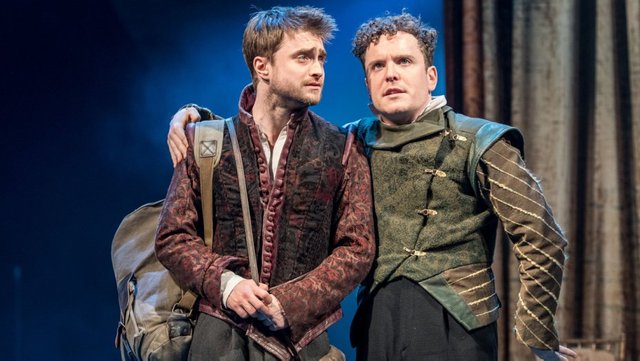
Daniel Radcliffe and Joshua Mcguire at the Old Vic - source
And so, not really understanding what’s happening, Ros and Guil take a passive approach to life, which is obvious throughout the play. They have no choice over what’s happening to them, which is marked by the fact that the two are constantly being transported to other places, without their knowledge. Early in the play, they are with the Tragedians in the woods and then miraculously appear at Elsinore Castle. And then, they randomly find themselves already on the ship to England, even though they can’t remember getting on-board.
Interestingly, Ros and Guil fail to make a crucial choice. When they find the letter ordering Hamlet’s death, they argue over what they should do about it, but in the end decide to be passive, with Guil explaining they might not understand the full implications of the letter.
But then, Hamlet discovers the letter, changes it, and they essentially decide their own deaths, through being passive.
Another big part of Rosencrantz and Guildenstern is the need for identity and meaning. Basically, the two characters are not as deep or as strong as Hamlet himself in the original play, but they are closer to the audience because they share a common desire – to find who they are and what they’re doing here.
Throughout the play, the other characters mistake one for the other, and often, it seems not even Ros and Guil themselves are able to tell who’s who.
ROS: We are Guildenstern and Rosencrantz.
GUIL: Which is which?
ROS: Well, I'm - You're -
This not only shows that the two lack identity, but also hints that Ros and Guil might be two sides of the same character, as in Samuel Beckett’s Waiting for Godot. Indeed, there are many similarities between the two plays – the passivity of the characters, their quest for meaning and their inability to change their fate.
But in the end, Rosencrantz and Guildenstern do not actually die.
Through the play, there’s this on-going debate between life and art, and the Player eventually leads the two to understand that a theatrical death is the only real death there is because the audience expects it. They’re prepared to believe it when they see the man on stage clutch his side and fall over. We see this when Guil stabs the Player and believes he has actually died – he expected him to, thinking the knife was real (it was not).
But Rosencrantz and Guildenstern don’t believe in their own impending deaths and neither does the audience. And the characters themselves are not actually shown dying. They merely disappear and then, it’s announced they’ve died.
By not actually showing their deaths, Stoppard makes his characters live on in eternity, allows the audience to disbelief their deaths.

Rafael Goldstein and Kasey Mahaffy at A Noise Within, Pasadena - source
‘Rosencrantz and Guildenstern’ is a fabulously complicated play, filled with meaning and symbolism. A very well chosen symbol is that of the boat in the third act, signifying Ros and Guil’s inability to decide their own fate. They are being carried to England, where they will die.
And since it’s such a complex play, I don’t think it’s possible to accurately explain it in one blog post, but I do hope I’ve managed to awaken your interest.
I highly encourage you to go see the play, if available to you. If not, the 1990 adaptation featuring Gary Oldman and Tim Roth is phenomenal, in my opinion, so maybe check that out.
Have you seen/read ‘Rosencrantz and Guildenstern are Dead’? What did you think?
Authored by @honeydue
references: 1 2 3 4
Original Thumbnail Pic
Click on the coin to join our Discord Chat

Witness proposal is here:
Go To Steem Witness Page
In the bottom of the page type: adsactly-witness and press vote.

Use small letters and no "@" sign. Or, click here to vote directly!
Thank you!
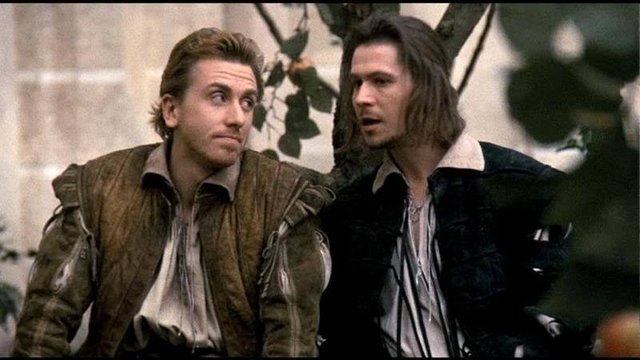
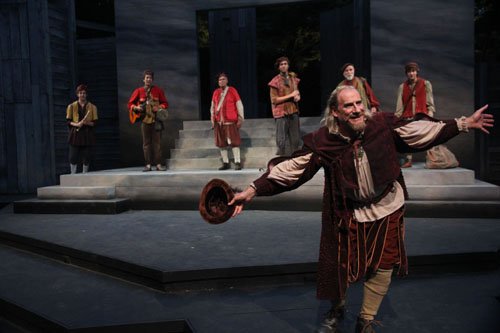
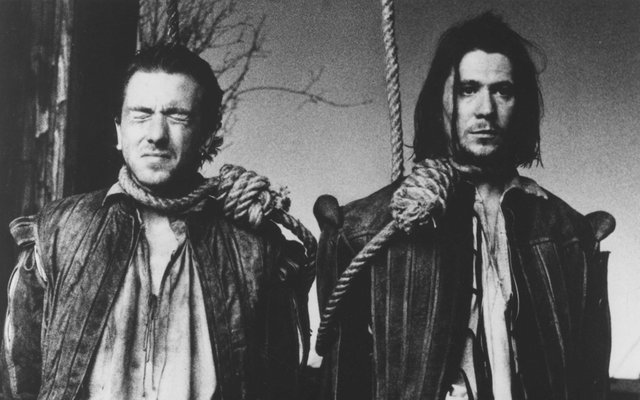
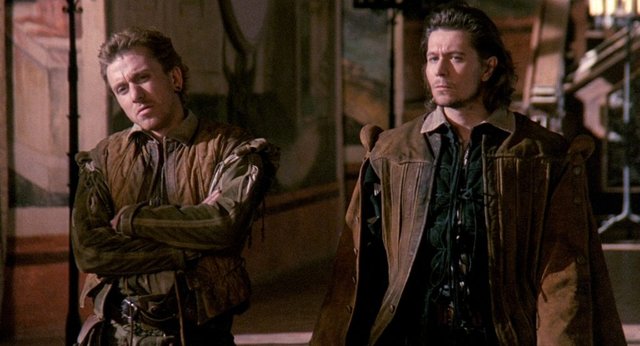
You explained very well the argument of 'Rosencrantz and Guildenstern', @honeydue. A piece, which although it may be absurd and complex to understand, looks interesting. Especially because the mirror game of doing theatre within the play, fiction within fiction, can be not only self-referential, but brilliant. I must admit that this is the first time I've heard about 'Rosencrantz and Guildenstern' and I haven't seen the film. The idea that emerges from the story seems to me to be very significant, since every day we are not only trying to decide but we often let ourselves be carried away by fate, perhaps because it can be easier and less compromising for the human being. Another work that adds to the great list of outstanding works. Thanks for the suggestion, @honeydue.
It's a really great play, so if you have the chance to see it - I say go for it! :) Thank you for the comment.
You certainly have awakened mine.
I had not read about the play.
I read Hamlet and have revisited in different formats several times. It would be great to look at it from the perspective of these minor characters.
I think that modern theater is very much underappreciated (and as a lit teacher who never found time during the semester to include drama because essays, poetry, and fiction occupied much of the syllabi, I'll take some of the blame too) and in need of rediscovery.
Thanks for the movie reference. I love Gary Oldman and Tim Roth. It will be nice to see them in their prime.
It's a truly great movie and I hope you enjoy it :) Really opened my eyes to Stoppard's work and those two are phenomenal actors.
Sadly, I think modern theater gets little to no recognition in the syllabus and this is a problem worldwide. Thank you for the comment!:)
Thank you for allowing us access to the knowledge (although it is referential) of this theatrical work, which, for your information and comments, is shown as a work of great interest. I can notice that there is a first-order intertextual game in it. Not only because it is based on the story of Hamlet, but, above all, because it recreates and transforms it, in some way, from that different perspective. It is undoubtedly a work of great irony (and perhaps some black humour). In addition to the themes you allude to (doubts about identity, the consequences of passivity, which I think are very Shakespearean), I could conjecture a critical and playful look at representation (in life and in theatre, also very Shakespearean).
Grateful for your great post, @honeydue. Greetings.
PS: Could you indicate the title of the film with Gary Oldman and Tim Roth?
The film was called Rosencrantz & Guildenstern are Dead, same as the play. Thank you for the comment :)
Thanks for the information. I will look for it. Greetings.